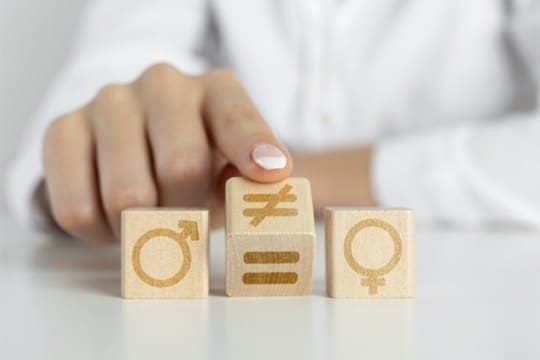
Adoption of “inclusive,” “desexed” language as a nod to transgender people negatively affects mothers’ and children’s well-being, creates scientific confusion, and results in discriminating policies against women, an international team of experts is warning.
A study entitled “Effective communication about pregnancy, birth, lactation, breastfeeding and newborn care: the importance of sexed language” is set to be published later this week. In the report, women’s health researchers from Australia, the United States, Europe, and Asia describe various observed impacts on the issue of “inclusive” medical language, consider a number of “potentially deleterious consequences,” and present recommendations on improving medical terminology to make it sex-specific “wherever possible.”
Officially changing terminology to make it more inclusive of people suffering from gender dysphoria, i.e., transgender people, has become popular in the United States and elsewhere in the “civilized” Western world.
For example, in a section about public health funding, the White House’s 2022 fiscal-year budget replaced the word “mothers” with “birthing people.”
The U.S. Centers for Disease Control and Prevention (CDC) refers to pregnant women as “pregnant people,” and calls breastfeeding mothers “breastfeeding people.” The same language is used by the U.S. Food and Drug Administration (FDA).
Last year, the House Speaker Nancy Pelosi introduced her new rules for Congress to ban “gendered” terms such as father, mother, son, daughter, and more in order to make the House of Representatives “the most inclusive in history.”
Such changes are endorsed by the United Nations (UN), which urges its staff to use “gender-inclusive language.”
Desexualized jargon has made its way into medical literature, too. For example, the study by the women’s health researchers quotes an article entitled “Historically, the Anatomy and Physiology of Bodies with Vaginas Have Been Neglected,” which was published in The Lancet, one of the world’s most prestigious medical journals.
Additionally, a worldwide organization of doctors called the Academy of Breastfeeding Medicine issued a statement in August 2021 saying that “not all people who give birth and lactate identify as female, and that some of these individuals identify as neither female nor male.” The organization called on healthcare practitioners to use “desexed or gender-inclusive language.”
While the authors of the study support the idea of respect and inclusiveness, they warn that “good intentions” behind desexualized language are actually harming women. They write:
Desexing the language of female reproduction has been done with a view to being sensitive to individual needs and as beneficial, kind, and inclusive. Yet, this kindness has delivered unintended consequences that have serious implications for women and children. These include: decreasing overall inclusivity; dehumanising; including people who should be excluded; being imprecise, inaccurate or misleading; and disembodying and undermining breastfeeding. In addition, avoidance of the term ‘mother’ in its sexed sense, risks reducing recognition and the right to protection of the mother-infant dyad.
The study explains that the use of “inclusive” terminology in relation to female reproduction works against the plain-language principle of health communication, and that, in turn, may risk excluding “vulnerable groups” from effective medical understanding.
“Those who are young, with low literacy or education, with an intellectual disability, from conservative religious backgrounds, or being communicated to in their non-native language are at increased risk of misunderstanding desexed language,” the researchers note.
Indeed, even educated women may get confused by such terms as “a person with a cervix,” “postnatal people,” or “chestfeeding.”
Moreover, the use of “mechanistic” terms to describe childbearing, birthing, and breastfeeding simply dehumanizes women and invalidates the very special and unique state of motherhood. It also undermines the mother-child relationship.
“[The word] ‘Mother’ holds meaning beyond that of ‘female parent’ containing connotations of ‘nurturing’, ‘nourishing,’ ‘love’, ‘responsibility’, and ‘child rearing’ that support the importance of mothers to children,” per the paper.
At the same time, “When undermining the mother-infant relationship is desired, mothers may be described differently.” For example, women whose children have been adopted by someone else are often called ‘birth mothers.’” That term is also used to describe mothers whose children are placed for adoption, and those mothers whose children have been removed from their care because of maltreatment.
Therefore, reducing mothers to “gestational parents,” “birthers,” or “caregivers” dismembers and objectifies them and dramatically reduces their importance to the children.
That linguistic perversion may lead to “undermining recognition of what mothers mean to all infants,” which may be even more dangerous to especially vulnerable mothers and infants.
Also, when it comes to breastfeeding, that crucially important process to both mother and child may be undermined by the introduction of such terms as “human milk feeding,” which disembodies breastfeeding and suggests that breastmilk is “just another type of milk.” While it aligns with the market interests of businesses that produce and sell breastmilk substitutes, it works against efforts to recognize the “unique relational aspects of breastfeeding that support maternal caregiving capacity and infant mental health,” argue the researchers.
In sum, one of the study’s co-authors, Jenny Gamble, a midwifery professor at the UK-based Centre for Care Excellence for Coventry University and the university hospitals of Coventry and Warwickshire, warned that, “Confusing the idea of gender identity and the reality of sex risks adverse health consequences and deeper and more insidious discrimination against women.”




